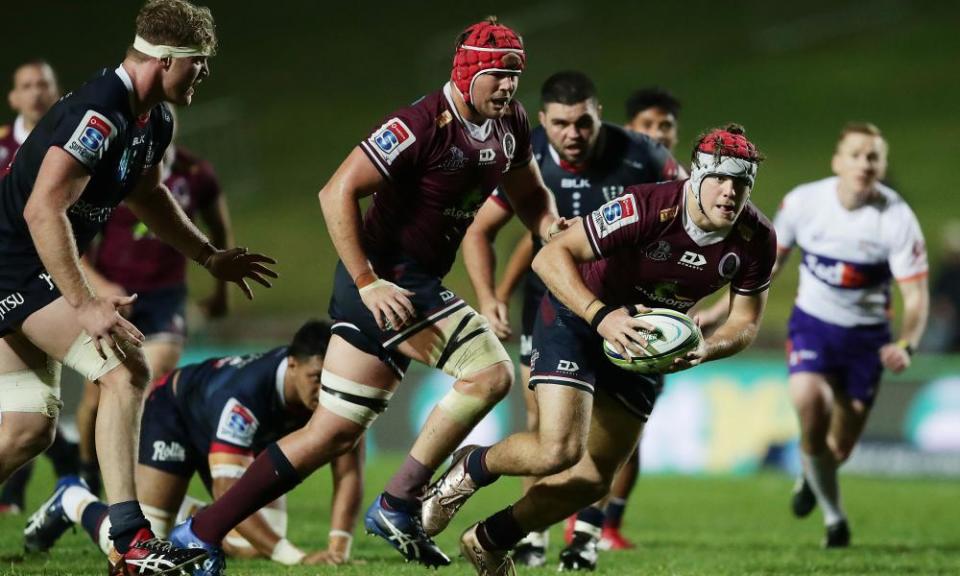If Kiwis come knocking, Australian rugby must take what it can get

If New Zealand offers Australia two or three places in a Trans-Tasman Super Rugby competition, Australian administrators should grab the opportunity with both hands.
There has been speculation New Zealand only wants limited Australian participation in any future competition involving the two countries because of concerns Australia is incapable of supporting any more than three teams.
Related: Super Rugby AU debut highlights New Zealand's ascendancy | Bret Harris
Rugby Australia chairman Hamish McLennan described New Zealand’s attitude as a “master-servant” mentality, but it’s time Australian rugby faces up to some harsh realities about the game in this country. After two rounds of Super Rugby AU it is abundantly clear Australia lacks the depth of playing talent to support five – or maybe even four – teams.
This problem will be exacerbated if RA fails to secure a lucrative new broadcast deal and more quality Australian players head overseas at the end of the year.
One of the main reasons Australian rugby got itself into so much trouble on and off the field was because of ambitious expansion into AFL-dominated states, Western Australia and Victoria, at a time when Australian playing resources were being depleted by rich clubs in Europe and Japan.
The two heartland states of NSW and Queensland produce the vast majority of professional Australian rugby players between them, heavily populating the Brumbies, Western Force and Melbourne Rebels in Super Rugby. With the exodus overseas, NSW and Queensland are also producing players for English Premiership Rugby, the French Top 14 and the Japanese Top League.
No wonder the Reds and the Waratahs look like shadows of the teams that won the Super Rugby title in 2011 and 2014 respectively.
In an ideal world it would be wonderful to have Super Rugby franchises in five Australian cities across the continent, but this country simply does not have the players to support that many sides and remain competitive.
Australia does not need five teams to be successful. Only two provincial teams – NSW and Queensland – supplied players to the Wallabies team that won the 1991 World Cup and just three Super Rugby franchises – Waratahs, Reds and Brumbies – made up the 1999 World Cup-winning Wallabies squad.
Fewer Australian teams would help Australia retain talented players and provide stronger, more attractive Super Rugby sides for fans, albeit in fewer markets. But until the so-called minor states begin to mass produce professional-standard players there should be a question mark over their participation in any future Super Rugby competition; simply, there aren’t enough players in Sydney and Brisbane to go around.
There has to be a place for Victoria and Western Australia in the Australian rugby landscape, but is it necessarily in Super Rugby? Maintaining five Super Rugby teams would require a radical rethink as to how to populate franchises in traditional non-rugby states.
It would be disastrous for Australian rugby if the Force raided the east coast as it did when it was founded in 2005 or if the Rebels spent a small fortune on both domestic and foreign players again as they did in 2011.
If the Force and the Rebels want to stay in Super Rugby, they may have to accept becoming development projects supported by long-term growth strategies rather than trying to buy instant success.
But that may not suit New Zealand’s objectives. Former All Blacks coach Steve Hansen’s claim that New Zealand owes Australia nothing is largely irrelevant. New Zealand will do what is best for New Zealand, which effectively means what is best for the All Blacks.
New Zealand will seek the best possible provincial competition to prepare Kiwi players for Test rugby. That is what it is all about over there.
Australia must do the same. Perhaps Rugby Australia believes having more teams will translate into a more valuable broadcast deal, but that would be a false economy. If Australian rugby continues to offer mediocre product, rugby fans will continue to switch off, which would devalue the sport.
There has been talk of Australia going it alone if New Zealand does not accept four or five Australian teams in a Trans-Tasman competition, but this would be foolhardy.
A five-team Australian Super Rugby competition would be economically unsustainable. RA could always partner with Andrew “Twiggy” Forrest’s Global Rapid Rugby to provide more content, but that would not meet high-performance requirements.
Australia needs to maintain a close connection with Kiwi rugby to develop Test players. Before Super Rugby, the close ties forged by NSW and Queensland with New Zealand provinces helped to raise the standard of Australian rugby to the point where the Wallabies won Bledisloe Cups, Grand Slams and World Cups.
Severing that Kiwi bond at the provincial level would see Australian standards fall even further than what they are now and that would be catastrophic. Australian rugby should accept any invitation to play it receives from New Zealand and be thankful.

 Yahoo Sport
Yahoo Sport 





































